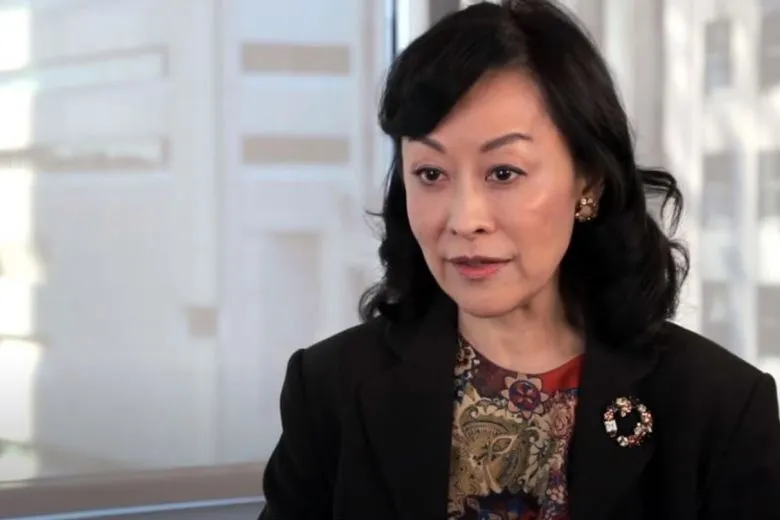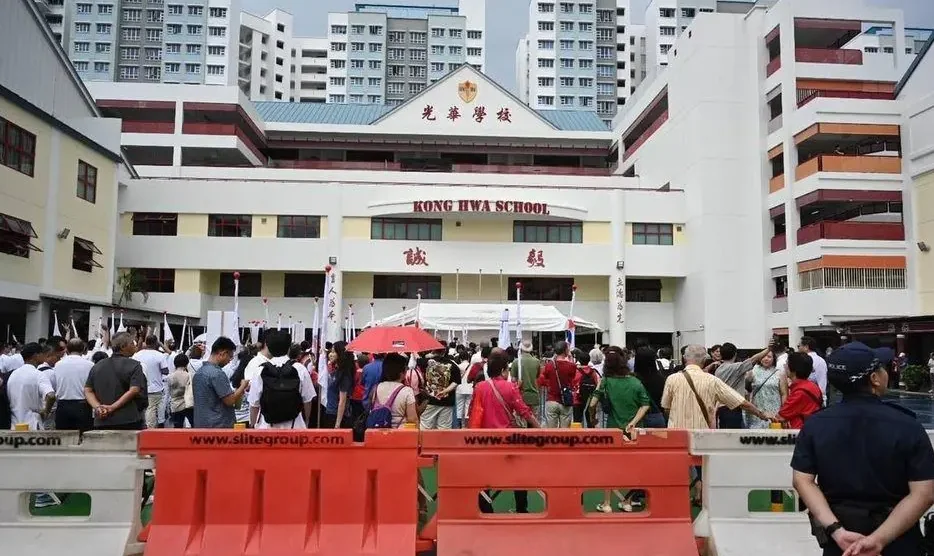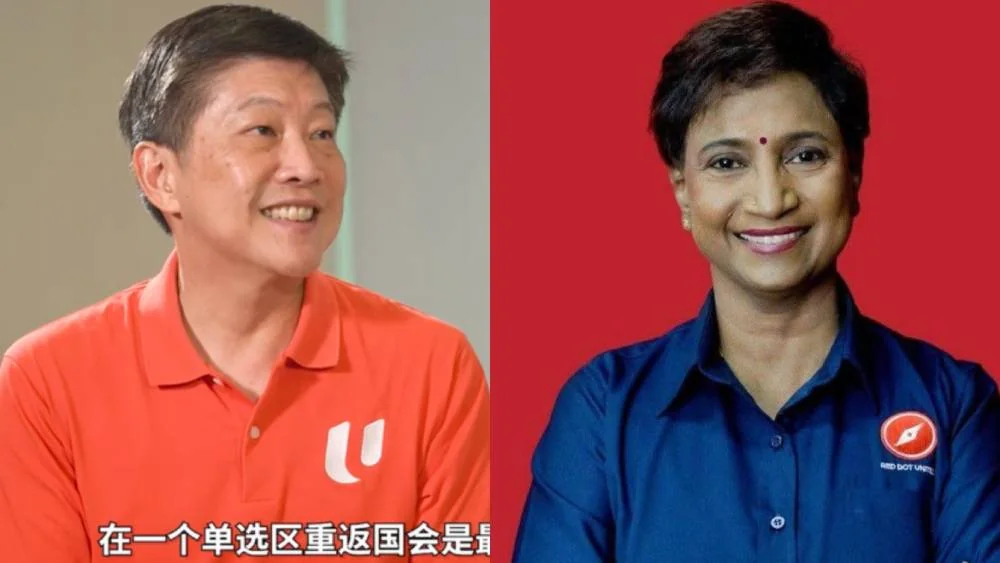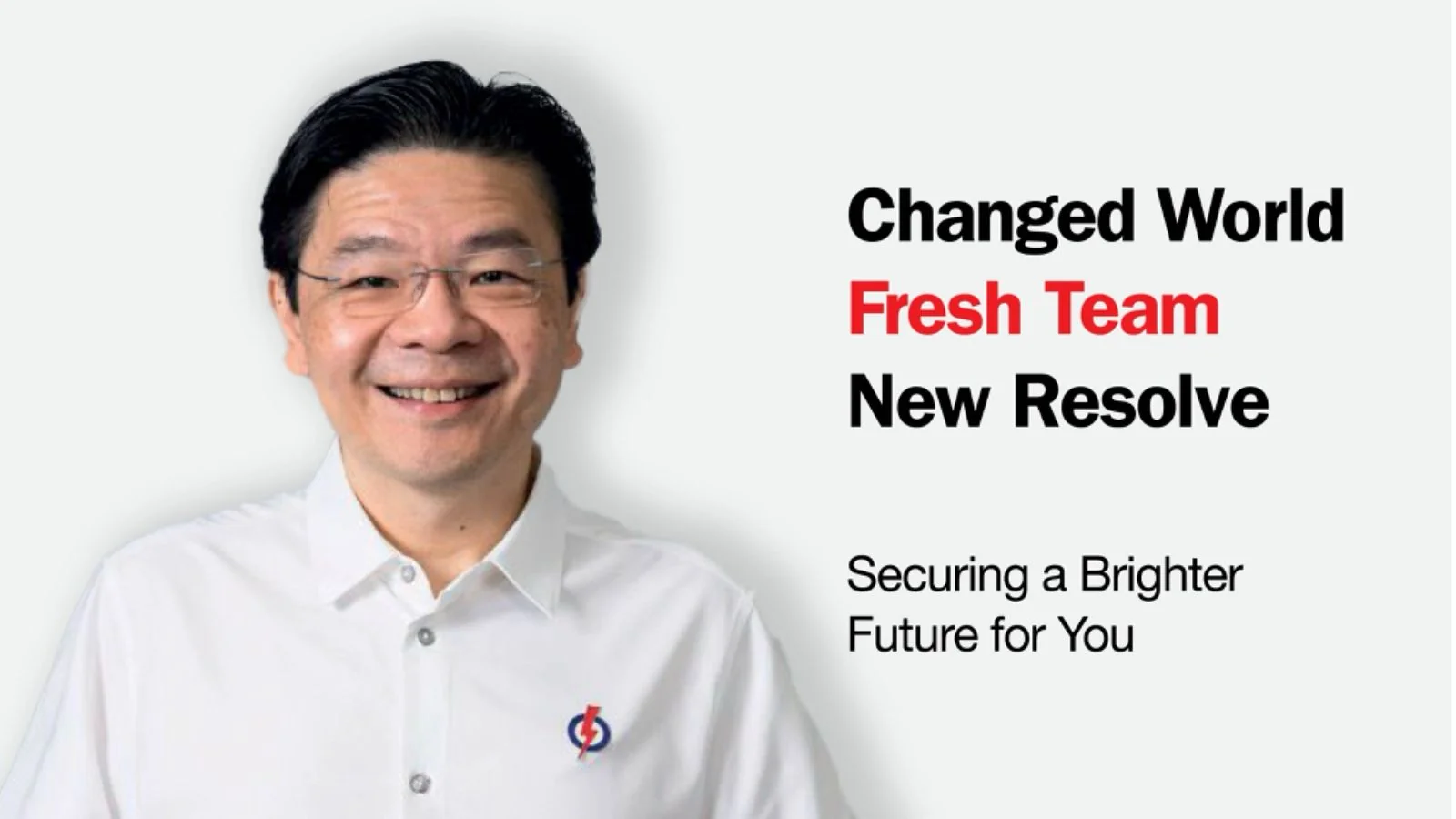林学芬律师因处理李光耀遗嘱失当被停职15个月
纪律法庭于今年二月裁定林学芬女士犯有严重不当的职业行为。照片来自摩根路易斯律师事务所的YOUTUBE。

纪律法庭于今年二月裁定林学芬女士犯有严重不当的职业行为。照片来自摩根路易斯律师事务所的YOUTUBE。

Dr Tan called PM Wong's statement on the US tariffs as a fear-mongering but later admitted that it's a very serious problem.

During the PSP's manifesto launch early this month (Apr 6), Dr Tan Cheng Bock, the party's chairman, criticized the government's response to the US tariffs as "overblown".
He suggested that the government's strong warnings, such as Prime Minister Lawrence Wong's (PM Wong) statement on about the "likelihood of a full-blown global trade war," might be an attempt to "instil fear" in voters to make them choose the incumbent as a "safe bet" ahead of the General Election.
In a YouTube video, PM Wong urged Singaporeans to brace themselves because the risks are real and the stakes high.
Dr Tan called for economists to study the real impact of the tariffs. "Don't just make statements of this kind and scare everybody," he said.
On Saturday (Apr 19), Dr Tan reiterated his party’s stance on the trade war, calling it “a very difficult problem, but a very serious problem” that “we are not taking lightly”.
He said: "Trump is so unpredictable. I cannot give you the answer also. But i don't think that we are just lying low and say oh, nothing to worry. of course, we worry differently. We are looking for answers. This is a very difficult, serious problem. And we are not taking it lightly."
PSP's position on the US tariffs reflects a critical view of the government's initial response as potentially exaggerated for political gain but later recognized the trade war's significant economic implications that should not be taken lightly.
If you have no time to read all manifestos, just read this summary.

The manifestos of the People’s Action Party (PAP), Workers’ Party (WP), Progress Singapore Party (PSP), and Singapore Democratic Party (SDP) for the 2025 Singapore General Election reveal a spectrum of priorities, as summarized in the following table:
| Aspect | PAP | WP | PSP | SDP |
|---|---|---|---|---|
| Vision | Stability and continuity; incremental improvements. | Pragmatic reform; balanced change. | Bold transformation; radical reforms. | Social justice and equity; transformative democratic change. |
| Cost of Living | Enhances Assurance Package, CDC vouchers, maintains GST at 9% with offsets. | GST exemptions for essentials, National Minimum Wage ($1,600). | Reduce GST to 7%, exempt essentials, defer HDB land costs. | Abolish GST on essentials, tax top 1%, reinstate estate duty, minimum wage. |
| Housing | Over 50,000 new HDB flats, Shorter Waiting Time flats, VERS rejuvenation. | 70-year BTO leases, universal buy-back schemes, affordability focus. | Affordable Homes Scheme (AHS), Millennial Apartments Scheme. | Non-Open Market (NOM) Scheme with $270,000 HDB price cap, sustainable VERS, more flats. |
| Jobs and Wages | Supports PMETs, fair employment safeguards, Progressive Wage Credit. | EP reforms, SkillsFuture enhancements, local talent priority. | $2,250 minimum living wage, EP quotas, retrenchment benefits. | Minimum wage, Talent Track Scheme for foreign PMETs, reduce foreign labor, scrap CPF Minimum Sum. |
| Social Safety Net | Reinforces ComCare, Silver Support, Workfare enhancements. | Expands healthcare subsidies, simplifies assistance, retiree support. | $1,800 minimum living income, caregiver allowances, MediSave expansion. | National Health Investment Fund (NHIF), free maternal/pediatric care, 10-point Malay community plan, gender equality initiatives. |
| Education | Customized education, SPED expansion, lifelong learning. | Class size caps at 23, holistic education, later school start times. | 10-year through-train program, class size reduction, local student priority. | Abolish PSLE, reduce class sizes, holistic curriculum, address socio-economic disparities. |
| Governance | Maintains stability, anti-corruption, improves communication. | Office of Ombudsman, standing committees, GRC abolition. | Freedom of Information Act, asset declaration, GRC abolition. | Reduce ministerial salaries, reform POFMA, constitutional reforms for civil liberties, divest GLCs, regional democratic partnerships. |
| Environment | New parks, marine parks, transport infrastructure. | Renewable energy targets (50% by 2040), forest conservation. | Environmental Impact Assessments, hasten renewables. | Strengthen Paris Agreement, EV incentives, oppose 10 million population, enforce haze act, reduce single-use packaging. |
| Feasibility | Highly feasible; leverages existing systems. | Feasible; builds on existing frameworks. | Ambitious but risky; requires significant changes. | Highly ambitious; faces significant fiscal and political challenges. |
| Voter Appeal | Appeals to conservative voters, older generations, middle to upper-income brackets valuing stability and economic growth. | Attracts middle-class families, younger voters concerned about housing and education, seeking a stronger check on PAP. | Draws younger demographics, lower-income workers, reformists willing to risk significant change. | Appeals to lower-income groups, youth, and reformists frustrated with inequality and governance restrictions, but may alienate moderates due to radicalism. |
This table highlights the diversity in approach, with PAP focusing on continuity, WP on balanced reform, PSP on transformative change, and SDP on social justice and democratic overhaul.
Addressing Public Concerns:
Housing:
Governance and Democracy:
Economic Growth:
Social Safety Net:
PAP: Appeals to voters valuing economic stability, strong governance, and proven leadership, attracting conservative voters, older generations, and middle to upper-income brackets. Its continuity is robust but may seem out-of-touch with reformists.
WP: Offers a credible, pragmatic alternative, appealing to middle-class families, younger voters concerned about housing and education, and those desiring a stronger check on PAP. Its balanced approach is feasible but may lack transformative vision.
PSP: Presents a bold platform for change, drawing support from younger demographics, lower-income workers, and reformists willing to risk significant change. Its ambition is appealing but faces feasibility challenges.
SDP: Champions social justice and democratic reform, appealing to lower-income groups, youth, and reformists frustrated with inequality and governance restrictions. Its radical proposals (e.g., abolish PSLE, scrap CPF Minimum Sum) resonate with those seeking systemic change but risk alienating moderates due to limited electoral track record and vague costings.
The election outcome on May 3, 2025, will hinge on voter priorities—stability versus change—and how each party builds trust amid economic and social challenges.
China aims to dominate ASEAN by leveraging Singapore’s diplomatic influence and cultural ties, while Israel seeks to preserve its strategic alliance with Singapore - one of very few countries still allied with Israel in ASEAN.

Disclaimer: This analysis is a speculative exploration based on geopolitical trends, historical patterns, and open-source intelligence.
Foreign interference isn’t a conspiracy theory; it’s a global reality, from Russia’s 2016 U.S. election hacks to China’s whispered influence in Australia.
Singapore, a tiny island with outsized influence, is a high-value target. Its role as a global financial hub, with approximately S$5.4 trillion in assets under management makes its electoral outcome a matter of international consequence.
China, Singapore’s largest trading partner with S$150 billion in bilateral trade in 2022, has strong incentives to influence GE2025.
As ASEAN’s diplomatic anchor, Singapore influences regional policies critical to China’s Belt and Road Initiative and South China Sea claims.
A government aligned with Beijing would enhance its dominance in Southeast Asia, where Singapore’s neutrality is a linchpin.
Moreover, Singapore’s military training partnerships with Taiwan make it a target for China’s efforts to suppress Taiwanese independence narratives.
Past disinformation campaigns
China has a well-documented history of disinformation:
Taiwan: Beijing has used deepfakes and propaganda to discredit Taiwanese leaders and deter voters from supporting independence, targeting Chinese-speaking communities to sow division, as reported by regional security experts.
Philippines: China has promoted narratives portraying itself as a constructive regional actor while casting doubt on U.S. reliability, aiming to weaken U.S.-Philippine ties, per the Center for Strategic and International Studies.
Singapore (2017): A notable incident involved Huang Jing, a U.S. citizen and academic at the Lee Kuan Yew School of Public Policy, who was expelled in August 2017 for acting as an agent of influence for a foreign country, widely understood to be China. Huang used his position to share privileged information with foreign intelligence operatives and attempted to influence Singapore’s foreign policy, per MHA.
Potential impact in Singapore
Singapore’s 74% ethnic Chinese population and economic ties with China create vulnerabilities to disinformation.
AI-generated deepfakes on platforms like Meta and Tiktok could depict candidates disparaging Chinese culture, alienating voters.
Cyber operations might target journalists of alternative and mainstream media outlets, while covert funding through Chinese business networks or clan associations could support pro-China candidates.
The October 2024 deepfake video targeting former President Halimah Yacob, falsely showing her criticizing the government, underscores this threat.
The 2020 case of Dickson Yeo, a Singaporean sentenced in the U.S. for spying for Chinese intelligence, further highlights Beijing’s use of local operatives, though Yeo claimed no disloyalty to Singapore.
Why Singapore?
Singapore’s diplomatic leadership in ASEAN and military ties with Taiwan make it a strategic target.
China’s ambition to dominate ASEAN relies on influencing key players like Singapore, whose neutral stance could shift regional dynamics if manipulated.
Disinformation could erode public trust or promote candidates aligned with Beijing’s goals.
Israel, a key defense partner supplying Singapore with technologies like the Iron Dome, seeks to maintain a government supportive of bilateral ties.
As one of Singapore’s few ASEAN allies alongside Thailand, and with neighbors like Malaysia and Indonesia holding anti-Israel stances, Singapore’s pro-Israel policies are crucial.
A change in government could disrupt defense cooperation or weaken Israel’s Southeast Asian foothold, where Singapore is a diplomatic and technological hub.
Past disinformation campaigns
Israel’s disinformation efforts, particularly since the Gaza war, have aimed to shape global narratives:
U.S. Lawmakers (2024): Israel funded a $2 million campaign through Stoic, a Tel Aviv-based firm, using 600 fake social media accounts to target 128 U.S. Congresspeople with pro-Israel messaging. Active as of June 2024, it employed AI tools like ChatGPT and fake news sites to attack UNRWA and influence policy (The New York Times, June 2024).
Gaza War propaganda: AI-driven bot farms spread false narratives to dehumanize Palestinians and pressure policymakers, as reported by The Intercept in February 2024 (Gaza: Israel, Netanyahu, propaganda, lies, Palestinians).
Meta censorship: Israel secured the removal of 38.8 million pro-Palestinian posts on Meta platforms by April 2025, aligning with efforts to suppress criticism (Dropsite News).
Specific falsehoods: Misleading claims, such as audio evidence in the Gaza Baptist Hospital massacre, highlight tactical disinformation (Euronews, February 2024).
Potential impact on Singapore
Israel’s cyber capabilities, exemplified by tools like Pegasus and Graphite used in Singapore pose a threat.
While the 2024 Graphite spyware from Paragon Solutions was reportedly halted, Israel’s history with Pegasus—sold to various governments—suggests that comparable tools remain active.
Disinformation campaigns might target Singapore’s Malay-Muslim community (15% of the population) to counter anti-Israel sentiments, using bots on platforms like Meta.
Covert lobbying through defense or tech partnerships could subtly influence policy.
Why Singapore?
Singapore’s status as a rare ASEAN ally makes it a linchpin for Israel’s regional strategy.
A pro-Israel government ensures sustained defense cooperation and counters regional hostility.
Disinformation could protect these ties by shaping elite perceptions or neutralizing anti-Israel narratives.
Singapore has fortified its electoral process against disinformation:
Foreign Interference (Countermeasures) Act 2021 (FICA): Enables authorities to remove false content and scrutinize foreign funding, countering China’s deepfakes and Israel’s bot campaigns Countering Foreign Interference.
Cybersecurity: The Cyber Security Agency (CSA) secures electoral systems, with 2023 advisories promoting robust digital protections Advisory to Presidential Election Candidates.
Public resilience: Media literacy campaigns and high public trust (84% in government, 2023 Edelman Trust Barometer) equip citizens to identify disinformation Commentary: What Singapore can do more against rising threat of foreign interference.
The FICA law was in the news recently when four members of one of Singapore's richest families were designated as "politically significant persons" for their membership to a China political advisory body. MHA had emphasised that the four individuals had not engaged in any “egregious activity”. As such, their designation can be seen as a pre-emptive move to guard against any potential vulnerabilities to foreign interference.
Also last year, FICA was invoked to block 95 social media accounts linked to self-exiled Chinese billionaire Guo Wengui, the first time that the account restrictions directions under FICA were being deployed.
China aims to dominate ASEAN by leveraging Singapore’s diplomatic influence and cultural ties, while Israel seeks to preserve its strategic alliance.
Singapore’s FICA, cybersecurity, and public resilience provide a strong defense, but sustained vigilance is critical.
Enhanced cyber audits, monitoring of foreign networks, and public education will ensure Singapore’s vote remains untainted.
As GE2025 approaches, the nation’s commitment to sovereignty will determine its success in countering these threats.
黄志明与卡拉·马尼卡姆的对决揭示信任与分裂的较量

2025年5月3日,Jalan Kayu单选区(Jalan Kayu SMC)的29,565名选民将站在十字路口,选择两条崎岖路径之一:人民行动党(PAP)职总秘书长黄志明,背负2024年职总英康收购案的污点,宛如一辆伤痕累累的战车;抑或红点团结党(RDU)的激进教育家卡拉·马尼卡姆,其2021年前进党诉讼风波暴露的个人主义倾向,恰似一艘独木舟在政治风浪中摇摆 [译注:2025年4月22日,红点团结党宣布退出Jalan Kayu单选区,支持工人党参选,以避免多角竞争。本文基于此前候选人假设撰写]。
黄志明曾于2009至2013年担任新加坡空军总长,2013至2015年升任三军总长,展现军事生涯的严谨与权威。2015年,他代表人民行动党当选巴西立-榜鹅集选区国会议员,但在2020年竞逐盛港集选区时,以47.88%的得票率铩羽而归。自2018年起,他担任职总秘书长,力推劳动力发展和工人权益政策,试图为职场注入活力。然而,2024年职总英康收购案令其公信力蒙尘,被舆论抨击“要么纵容利益输送,要么严重失职”,如同一座信任堡垒被风暴侵蚀。
卡拉·马尼卡姆是单亲母亲、特殊教育专家兼中小企业主,拥有终身教育硕士学位,散发草根魅力。她是新加坡武装部队首批女军官之一,服役七年,官至中尉,彰显坚韧。2020年,她代表前进党竞选义顺集选区,获38.76%选票;同年12月被开除,2021年提起“不当终止党籍”诉讼,后和解。此事暴露其“独行侠”作风。如今,她加入红点团结党,聚焦职业培训和生活成本压力,试图以小党之力撬动选民心弦。
2024年7月,职总与德国保险巨头英杰华(Allianz)提出22亿新元的收购案,宣称将增强职总英康的竞争力。8月,黄志明与职总主席达纳拉克希米发表联合声明,信誓旦旦保证英杰华将维护英康的社会使命。然而,细节如暗礁般浮现,险些葬送交易。英杰华计划提取18.5亿新元资本,近半投资可迅速回笼,恐耗尽维持低保费的储备金,宛如从社会保障的根基抽梁换柱。2024年10月14日,文化、社区及青年部长唐振辉代表政府果断叫停交易,认定其背离英康2022年公司化目标,即强化财务实力以惠及保单持有人。
黄志明坚称职总中央委员会对资本提取计划毫不知情,试图撇清责任,但前英康首席执行官陈瑞财痛斥该计划“违背诚信”,直指交易暗藏私利。新加坡管理大学副教授陈庆文直言,这种无知“令人瞠目结舌” [译注:意指难以置信的疏忽],如同指挥官在战场上迷失方向。2025年1月,黄志明将就业不稳定性归咎于人工智能,回避外籍劳工政策争议,被批“高高在上”,如同一座与民意脱节的孤塔。2020年盛港集选区失利已暴露其政治软肋,选民不禁质疑:他究竟是工人代言人,还是行动党机器的忠实齿轮?
2021年7月,卡拉向高等法院起诉前进党,后移交国家法院,掀起政治风波。她要求宣告2020年12月开除决定“违法无效”,并追讨1万新元竞选开支,指控前进党违宪,未给予她申辩机会。前进党提交七份宣誓书,包括党魁陈清木的证词,指控她破坏团队凝聚力、抗命不遵。同区候选人郑德源透露,她跳过团队会议、擅自组织走访,形同独奏而非合唱。17人联署反对其复职,干部以55:11的投票支持开除决定。
陈清木回忆,2020年11月会议上,卡拉“挑衅好斗”,高喊“证据呢?证据呢?”,如同一头不甘受缚的猛兽。她通过脸书和法庭公开控诉,展现原则性,却也暴露分裂倾向,宛如在政治舞台上独舞。转投红点团结党被批“机会主义”,如同一名独行侠在寻找新战场。诉讼虽和解,但卡拉的个人主义标签挥之不去,恐难适应新加坡强调协作的政治生态。
黄志明依托行动党强大的基层网络,Jalan Kayu单选区与宏茂桥集选区的历史渊源为其加分。然而,英康风波重创公信力,盛港失利阴影犹存,选民质疑其是否真为工人发声。卡拉的草根形象贴近民心,反对党协调机制或助其整合选票,但诉讼风波暴露团队协作缺陷,红点团结党知名度有限,难以撼动主流。工人党未派候选人,人民力量党若参选可能分散反对派选票,但红点团结党与其他小党的协调或可缓解分裂风险。这场选举无关谁是耀眼的明星,而是两块“卡由”(马来语“木头”谐音,喻指不完美的候选人)中,谁能更稳固地承载选民的期望。
PAP manifesto focuses on economic growth, education, social support, healthcare, housing, sustainability, arts, and social cohesion, with detailed initiatives in each area.

The People's Action Party (PAP) launched their manifesto last Thursday (Apr 17), titled "Changed World, Fresh Team, New Resolve – Securing a Brighter Future for You."
Manifesto focuses on economic growth, education, social support, healthcare, housing, sustainability, arts, and social cohesion, with detailed initiatives in each area.
Here are the key points:
The PAP, as the ruling party, launched its manifesto on April 17, 2025, titled "Our Manifesto, Our Promise," at Infinite Studios. Prime Minister Lawrence Wong emphasized navigating global changes and defending Singapore's interests. Key proposals include:
Education is framed as a cornerstone for future success, with a focus on inclusivity and lifelong learning:
This pillar aims to build a flexible and inclusive education system, though challenges may arise in scaling these initiatives effectively.
Social support is a critical focus, aiming to uplift vulnerable groups and ensure inclusivity:
These measures aim to create a more inclusive society, though their impact may vary based on funding and community uptake.
Healthcare initiatives are designed to cover the entire lifespan, ensuring comprehensive care:
These initiatives aim to build a robust healthcare system, though challenges may include workforce retention and funding sustainability.
Housing remains a priority, addressing both supply and quality of living:
These efforts aim to ensure affordable and quality housing, though market dynamics may pose implementation challenges.
Sustainability is a key focus, balancing urban development with environmental care:
These initiatives aim to create a sustainable urban environment, though their success may depend on community engagement and funding.
Arts and culture are highlighted as vital for quality of life and national identity:
These efforts aim to enrich cultural and sporting life, though their impact may vary based on public participation.
Social cohesion is framed as essential for national unity and resilience:
These measures aim to build a united and engaged society, though their effectiveness may depend on community buy-in.
| Pillar | Key Initiative | Target Beneficiaries |
|---|---|---|
| Economic Growth | Adopt AI and clean energy | Businesses, PMETs |
| Education | Build 4 new SPED schools by 2030 | Students with special needs |
| Social Support | Extend Progressive Wages to more sectors | Lower-wage workers |
| Healthcare | Add 13,600 new hospital beds in 5 years | General population |
| Housing | Build 50,000 new HDB flats in 3 years | Home seekers |
| Sustainability | Create 25 new parks | Residents, environmentalists |
| Arts and Culture | Expand SG Culture Pass | Arts enthusiasts |
| Social Cohesion | Enhance integration efforts | New citizens, diverse groups |
| Su | Mo | Tu | We | Th | Fr | Sa |
|---|---|---|---|---|---|---|
30 | 31 | 1 | 2 | 3 | 4 | 5 |
6 | 7 | 8 | 9 | 10 | 11 | 12 |
13 | 14 | 15 | 16 | 17 | 18 | 19 |
20 | 21 | 22 | 23 | 24 | 25 | 26 |
27 | 28 | 29 | 30 | 1 | 2 | 3 |